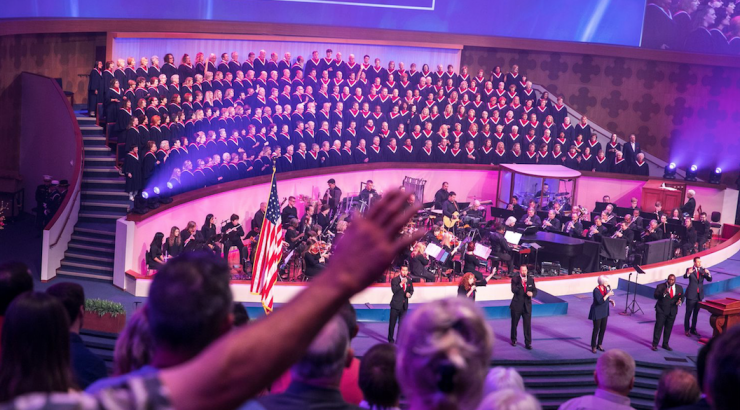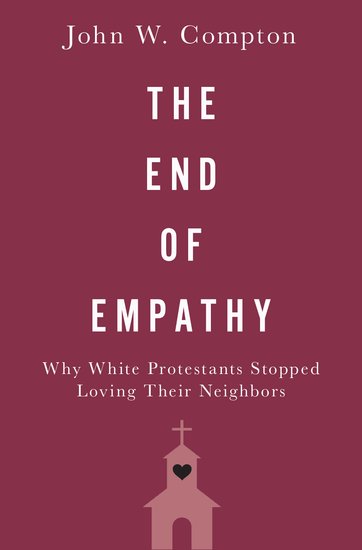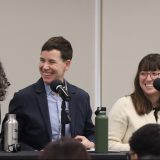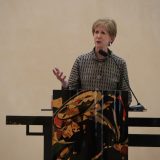
The Twists and Turns of Evangelical Politics A Q&A with Dr. John Compton
April 10, 2020

Dr. John Compton (Political Science)
Dr. John Compton’s (Political Science) new book, The End of Empathy: Why White Protestants Stopped Loving Their Neighbors, explores a timely issue: the connection between religion and politics. Through a mix of archival research and public opinion data, The End of Empathy traces the changing social values of white Protestants over the past century.
Compton visited a dozen archives around the country to examine the records of once-powerful religious bodies like the National Council of Churches, to offer a look at the politics of the white Protestant community. Check out our Q&A with him below.
—
Voice of Wilkinson: What was your inspiration for the book? Why did you want to write it?
Dr. John Compton: I was puzzled by a radical shift in the political orientation of non-Southern white Protestants that occurred during the 1960s and 1970s. Until the mid-1960s, northern white Protestants were often found on the front lines of progressive social reform movements. For example, in the 1910s they were instrumental in abolishing child labor; then in the early 1960s, they played a critical role in the push for federal civil rights legislation.
Since about 1980, however, churchgoing white Protestants (in both the North and the South) have tended to exhibit lower levels of social concern than almost any other group: they tend to favor harsh immigration restrictions, steep cuts to welfare and foreign aid programs, and to oppose refugee programs. In other words, where religious engagement used to foster empathy and social concern in these citizens, it now seems to do the opposite.
VoW: The End of Empathy is your second book. What has the book-writing process been like for you this time around?
JC: This time was much more enjoyable! By the time I finished my first book, which was based on my dissertation, my interests had begun to shift away from legal history and constitutional issues (which were the focus of that book). I realized I wanted to study religion and its impact on political behavior, and how this relationship has evolved across American history. So, after getting tenure, I made the somewhat unusual decision to move into a completely new field – the field of religion and politics.
 VoW: So what is the importance of exploring politics and law from a religious lens when, constitutionally, the political sphere is traditionally secular?
VoW: So what is the importance of exploring politics and law from a religious lens when, constitutionally, the political sphere is traditionally secular?
JC: While it’s true that the First Amendment bars Congress from establishing a national religion, religion and politics have always been intertwined in our nation’s history. At least through the 1960s, religion was arguably one of the most important forces shaping American political development. It’s hard to explain events such as the civil rights movement, for example, without reference to churches and religion.
And yet, I would argue – and I do argue in the book – that religion’s influence on American politics has actually declined markedly since the 1970s. True, certain religious activists get a lot of media attention (usually politically conservative ones), but in contrast to earlier periods of American history, there is little evidence that religion is actually shaping voting behavior.
Put another way, religious citizens who identify as Republicans tend to vote like other Republicans, and religious citizens who identify as Democrats tend to vote like other Democrats. Party identification, not religious affiliation, is the real driver of political behavior for even the most religious of citizens. I argue that religion’s present-day influence on politics is vastly overrated: if we could somehow magically dispense with organized religion, our politics would likely remain just as polarized as it is today.
VoW: What did you learn about the values of white evangelical voters from writing this book?
JC: To put it briefly, white evangelical values are Republican values. A central theme of the book is that white evangelicals really do not constitute a distinct voting bloc; they are Republicans through-and-through, and they are likely to support whoever the party puts on the ticket, regardless of his or her positions on “religious” or “moral” issues, and regardless of his or her personal behavior in the moral realm.
We saw this clearly in 2016 when white evangelicals overwhelmingly supported a candidate (Donald Trump) whose personal behavior flew in the face of biblical teachings on a range of issues. But, as I argue in the book, this should not have been surprising: since at least 1980, partisanship, not religion, has been the main driver of evangelical voting behavior.
VoW: Do you think there is a way back to empathy for these voters you have written about?
JC: The past few years have seen a sharp decline in religious participation, and there is some evidence that the decline has been driven by a sense, particularly on the part of younger Americans, that religious leaders are hypocrites – that their political behavior does not align with the biblical values of empathy and compassion that they claim to stand for.
Now, there may be some truth to this. But as I argue in the book, it’s not as if evangelical leaders haven’t tried to generate support for empathetic policies. In recent years, several prominent evangelical leaders have in fact worked to build support for policies such as immigration reform, for combating climate change, and for boosting foreign aid and refugee programs.
VoW: What is the danger if the Evangelical community continues down the road to the “end of empathy”?
The problem is that evangelical leaders today (in contrast to the pre-1970s period) have almost no authority vis-à-vis the people in the pews. All of these elite-led efforts failed because rank-and-file evangelicals (who are overwhelmingly politically conservative) rebelled against them, and the elites who were pushing for more liberal policies were either forced out or forced to back down.
So, again, we see evidence that, in the case of white evangelicals, religious identity has fused with political identity. Any proposed policy stance that smacks of “liberalism” or “progressivism” is likely to be vetoed by the people in the pews.
—
To read more about this intersection of politics and religion, check out The End of Empathy: Why White Protestants Stopped Loving Their Neighbors, which is available for pre-order now.

